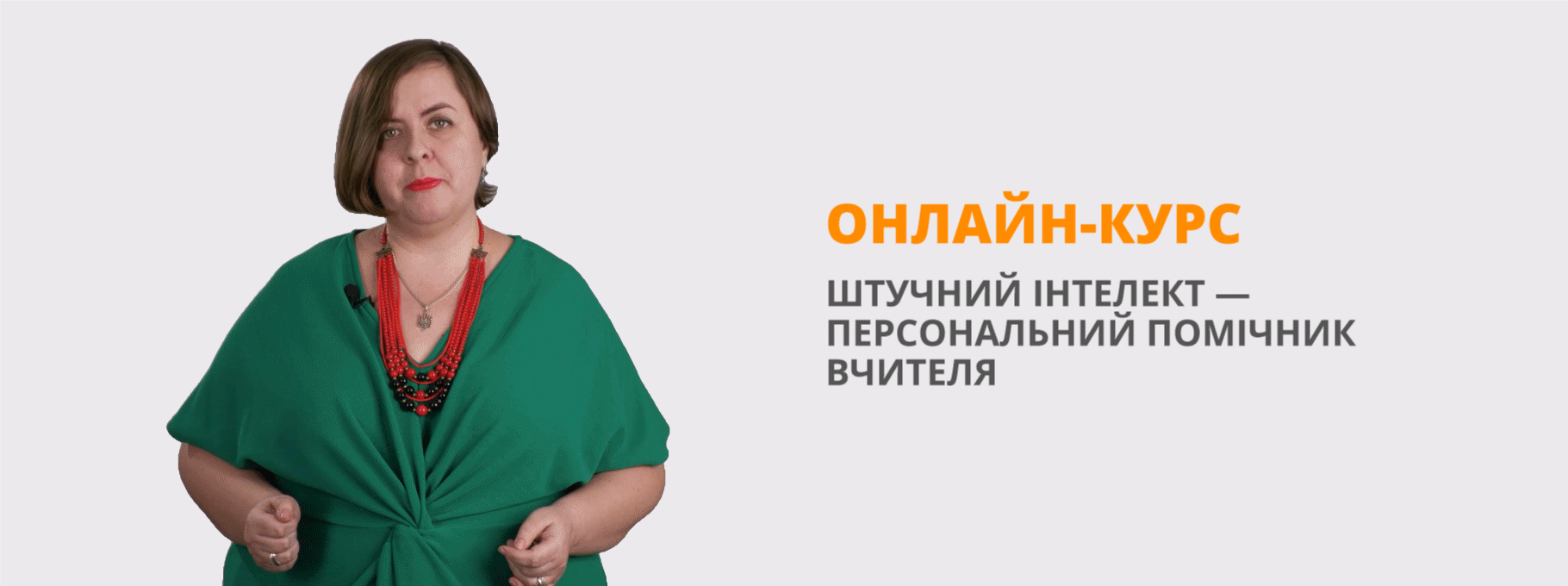Матеріали для успішног проведення літнього мовного табору
The detachment «Rainbow»
Our emblem:
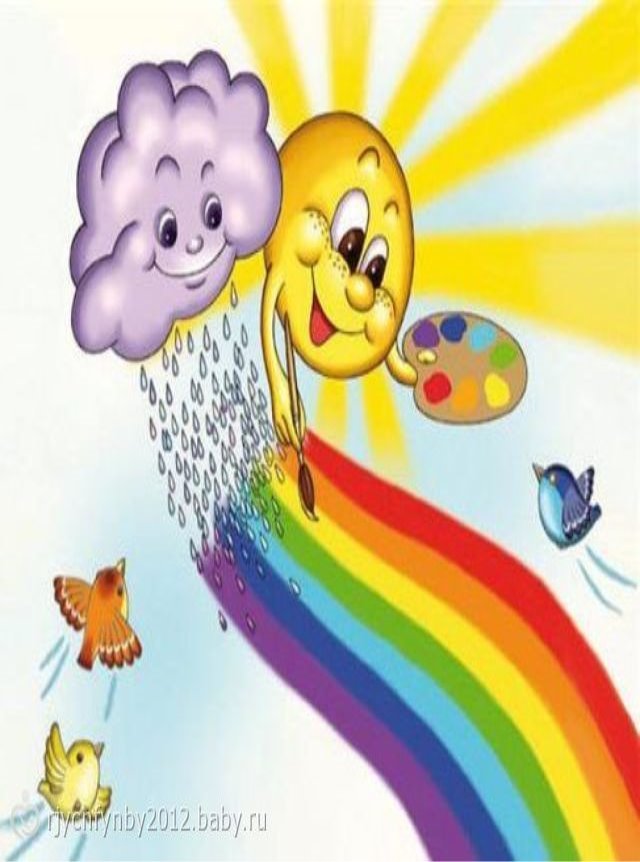
Our motto: Red and orange, red and orange
Yellow, green and blue .
Colors of rainbow
Shine on me, shine on you.
We want to be strong,
We want to be clever,
We want to be healthy,
Forever
Our shouting:
We are rainbows colorful
Our English is beautiful.
Hello, happy some holidays!
Hello, new friends!
Hello, wonders and strong health!
Our song:
“ Sing a Rainbow”
Red and yellow, pink and green
Purple and orange and blue,
I can sing a rainbow
Sing a rainbow,
Sing a rainbow too.
Listen with your eyes (2 times)
And sing everything you see
You can sing a rainbow (2 times)
Sing along with me.
Red and yellow, pink and green
Purple and orange and blue,
I can sing a rainbow
Sing a rainbow,
Sing a rainbow too.
The rules of life in camp
- Don’t be discouraged, friends to entertain .
- Hygiene, sport and work are always going near.
- Air, sun and grass in the meadow are our best friends.
- There is no dad and mom, you clean it up.
- Senior respect themselves, kid’s don’t hurt.
- Love and know your native land.
The members of the detachments of the camp shall be a solemn oath:
To respect your elders themselves- promise!
Don’t hurt yourself smaller- promise!
To believe in sincere friendship-promise!
To love work, game and song-promise!
Правила життя табору
- Не сумувати, друзів звеселяти
- Гігієна спорт і труд завжди поруч ідуть
- Повітря, сонце і травиця в лузі – ось найкращі наші друзі.
- Тут немає тат і мам, прибери усе ти сам
- Старших себе поважай, малюків не ображай.
- Люби і знай свій рідний край.
Члени загону мають скласти урочисту присягу:
Поважати старших себе - обіцяємо!
Не ображати менших себе – обіцяємо!
Вірити у щиру дружбу – обіцяємо!
Любити працю, гру і дружбу – обіцяємо!
Everyday’s rules for group “Rainbow”
Always listen to the instructor
Never leave the campground
Don’t touch dead animals
No fighting or bullying
Follow the rules
No rude language
Don’t litter
Have fun!!!!
Plan of activities
|
№ |
Date |
Theme |
|
1 |
|
Day of European countries
|
|
2 |
|
Day of family and friends
|
|
3 |
|
Day of tale
|
|
4 |
|
Day of art
|
|
5 |
|
Day of healthy style of life
|
|
6 |
|
Day of nature
|
|
7 |
|
Day of sports
|
|
8 |
|
Day of school subjects
“ My school” |
|
9 |
|
Day of future profession
|
|
10 |
|
The grand closing ceremony. Presentation day. |
Правила поводження в таборі та під час літніх канікул
Вимоги безпеки життєдіяльності учнів під час літніх канікул та роботи пришкільних таборів:
Під час канікул, перебуваючи на вулиці й ставши учасником дорожньо-транспортного руху, чітко виконувати правила дорожнього руху:
● рухатися тротуарами і пішохідними доріжками, дотримуючи правого боку;
● за межами населених пунктів, рухаючись узбіччям чи краєм проїжджої частини, йти назустріч руху транспортних засобів;
● переходити проїжджу частину тільки по пішохідних переходах, зокрема підземних і наземних, а за їх відсутності — на перехрестях по лініях тротуарів або узбіч;
● у місцях із регульованим рухом керуватися тільки сигналами регулювальника чи світлофора;
● виходити на проїжджу частину з-за транспортних засобів упевнившись, що не наближаються інші транспортні засоби;
● чекати на транспортний засіб тільки на посадкових майданчиках (зупинках), тротуарах, узбіччях, не створюючи перешкод для дорожнього руху;
● на трамвайних зупинках, не обладнаних посадковими майданчиками, можна виходити на проїжджу частину лише з боку дверей і тільки після зупинки транспортного засобу;
● у разі наближення транспортного засобу з увімкненим проблисковим маячком червоного або синього кольору, чи спеціальним звуковим сигналом, потрібно утриматися від переходу проїжджої частини або негайно залишити її;
● категорично заборонено вибігати на проїжджу частину влаштовувати на ній або поблизу неї ігри, переходити проїжджу частину поза пішохідним переходом, або встановленими місцями;
● проїжджою дорогою рухатися на велосипеді можна тільки дітям, які досягли 16-ти років; мопеди й велосипеди повинні бути обладнанні звуковим сигналом та світлоповертачами: попереду — білого кольору, по боках — оранжевого, позаду — червоного; на голові у водія має бути захисний шолом; слід чітко дотримуватися правил дорожнього руху;
● водіям мопедів і велосипедів заборонено: керувати транспортом із несправним гальмом, звуковим сигналом, у темну пору доби; рухатися по автомагістралях, якщо є поряд велосипедна доріжка; рухатися по тротуарах і пішохідних доріжках; їздити не тримаючись за кермо та знімати ноги з педалей; перевозити пасажирів; буксирувати інші транспортні засоби;
● для катання на інших засобах (скейтборд, самокат, ролики та ін.) слід обирати місце на дитячих майданчиках та ін., на проїжджу частину виїжджати заборонено;
● учні повинні виконувати зазначені правила, а також інші Правила дорожнього руху України, знання про які були отримані на уроках основ здоров'я, виховних годинах, предметних уроках;
● перебувати поблизу залізничних колій дітям без супроводу дорослих заборонено;
● учні, користуючись транспортним засобом, повинні сидіти або стояти тільки в призначених для цього місцях, тримаючись за поручень або інше пристосування.
Під час канікул, перебуваючи вдома, на вулиці, в спеціалізованих установах, приміщеннях, транспорті, учні повинні чітко виконувати правила пожежної безпеки:
● заборонено брати із собою вогненебезпечні предмети, що можуть спричинити пожежу (запальнички, сірники, петарди, бенгальські вогні, феєрверки, цигарки, легкозаймисті речовини, вогнезаймисту рідину та ін.);
● користуватися газовою плитою вдома тільки зі спеціалізованим електричним приладом для вмикання і під наглядом дорослих;
● заборонено використовувати віконниці на вікна для затемнення приміщень і застосовувати горючі матеріали; зберігати бензин, газ та інші легкозаймисті горючі рідини, приносити їх до приміщення; застосовувати предмети оформлення приміщень, декорації та сценічне обладнання, виготовлене з горючих синтетичних матеріалів, штучних тканин і волокон (пінопласту, поролону, полівінілу та ін.); застосовувати відкритий вогонь (факели, свічки, феєрверки, бенгальські вогні та ін.), хлопавки, дугові прожектори; влаштовувати світлові ефекти із застосуванням хімічних та інших речовин, що можуть спричинити загоряння; встановлювати стільці, крісла та ін., конструкції, виготовлені з пластмас і легкозаймистих матеріалів, а також захаращувати предметами проходи та аварійні виходи;
● у жодному разі не брати на вулиці чи в іншому місці незнайомі, чужі предмети, зокрема побутову техніку, не вмикати їх у розетку вдома чи в інших установах — це може призвести до вибуху та надзвичайної ситуації;
● не наближатися до електроприладів, музичної апаратури, що живляться струмом. Користуватися електроприладами тільки сухими руками і в присутності батьків. У разі виявлення обірваних проводів, неізольованої проводки, іскріння проводки, слід негайно повідомити дорослих;
● не скупчуватися біля проходів у громадських установах, біля входів та виходів, у приміщеннях вестибюлю;
● під час участі в масових заходах не галасувати, не свистіти, не бігати, не стрибати, не створювати травмонебезпечних ситуацій у приміщенні, виконувати правила пожежної безпеки;
● у разі пожежної небезпеки (наявності вогню, іскріння, диму) слід негайно вийти на повітря (за двері, балкон) та кликати на допомогу. Викликати службу пожежної охорони за номером 101, назвавши своє ім'я, прізвище, коротко описавши ситуацію: наявність вогню, диму, кількість людей у приміщенні, залишити номер свого телефону;
● при появі запаху газу в квартирі, приміщенні у жодному разі не вмикати електроприлади, не користуватися стаціонарним чи мобільним телефоном, відчинити вікна, двері, перевірити приміщення, вимкнути газову плиту, якщо вона була ввімкнена, й вийти з приміщення; покликати на допомогу дорослих, негайно повідомити в газову службу за номером 104 чи пожежну охорону — 101; назвавши своє ім'я, прізвище, коротко описавши ситуацію й залишивши номер свого телефону.
Під час канікул, перебуваючи вдома, на вулиці, в спеціалізованих установах, громадських місцях, приміщеннях, транспорті та ін. учні повинні чітко виконувати правила з попередження нещасних випадків, травмування, отруєння та ін.:
● під час канікул заборонено перебувати біля водойм без супроводу дорослих для запобігання утоплення дітей. Відпочиваючи у прибережній зоні, слід виконувати правила безпечної поведінки на воді; не запливати за огороджувальні буї, не підпливати до моторних човнів, вітрильників, веслових човнів та інших плавзасобів; на залізати на технічні та попереджувальні знаки, буї та інші предмети; не використовувати рятувальні засоби і спорядження не за призначенням; не стрибати у воду зі споруд, не пристосованих для цього, й у місцях, де невідомі глибина та стан дна; не організовувати у воді ігри, пов'язані з пірнанням і захопленням тих, хто купається; Не стрибати у воду з човнів, катерів, вітрильників та інших плавзасобів; не використовувати для плавання дошки, камери від волейбольний м'ячів, рятувальні круги, надувні матраци (особливо у штормову погоду); не купатися біля причалів та у вечірній час, особливо після заходу сонця; не стрибати у воду в незнайомих місцях; не купатися біля обривів, зарослих рослинністю берегів; не засмічувати воду та узбережжя, не залишати та не кидати сміття. Заборонене купання у затоплених кар'єрах, каналах, озерах, пожежних водоймах, ставках, морських акваторіях та інших водоймах, що не мають обладнаних пляжів сезонними рятувальними постами, не зареєстровані місцевою владою як місця масового відпочинку. Під час купання не слід робити зайвих рухів, не пірнати, не потрібно тримати свої м'язи в постійній напрузі, не порушувати ритму дихання, не перевтомлювати себе, не брати участі у великих запливах без необхідних тренувань та дозволу лікаря. Не можна заходити у воду спітнілим або після прийому сонячних ванн, жвавих ігор. Щойно ви починаєте замерзати, необхідно негайно вийти з води, енергійно розтертися рушником і швидко одягтися. Категорично заборонено заходити у воду, якщо ви погано почуваєтеся;
● категорично заборонено наближатися й перебувати біля будівельних майданчиків, кар'єрів, закинутих напівзруйнованих будівель для запобігання обрушень будівельних матеріалів й попередження травм та загибелі дітей;
● категорично заборонено вживати алкоголь, наркотичні засоби, тютюнові вироби, стимулятори;
● категорично заборонено брати до рук, нюхати, їсти незнайомі дикі рослини чи паростки квітів, кущів, дерев, що може призвести до отруєння;
● пересуватися слід обережно, спокійно. Беручи участь в іграх, не створювати хаотичного руху, не штовхатися, не кричати. На вулиці бути обережним, дивитися під ноги, щоб не впасти в яму чи відкритий каналізаційний люк;
● на вулиці не варто підходити до обірваних, обвислих проводів або проводів, що стирчать, а особливо, якщо від них іде гудіння — ці проводи можуть бути ще підживлені електрострумом;
● не слід наближатися до щитових, залазити на стовпи з високовольтними проводами — можна отримати удар електрострумом від високовольтних живлень на відстані 5 м;
● потрібно бути обережним на дитячих майданчиках, у парках відпочинку: спочатку переконатися, що гойдалки, атракціони, турніки та інші прилади справні, сильно не розгойдуватися й не розгойдувати інших, щоб не призвести до падіння чи іншого травмування;
● не можна виходити на дах багатоповерхівки для попередження падіння дітей із висоти;
● не підходити до відчинених вікон, не нахилятися на перила, парапети сходинок для запобігання падіння дітей із висоти;
● не спускатися у підвали будинків чи інші підземні ходи, катакомби, бомбосховища —там може бути отруйний газ;
● не контактувати із незнайомими тваринами для запобігання отримання укусів від хворих на сказ тварин;
● застосовувати всі знання й правила, отримані на уроках основ здоров'я, виховних годинах, навчальних уроках.
Під час канікул учні повинні виконувати правила безпеки життєдіяльності під час самостійного перебування вдома, на вулиці, у громадських місцях, друзів, у замкнутому просторі приміщень із незнайомцями, а також виконувати правила попередження правопорушень та насильства над дітьми:
● не розмовляти й не контактувати із незнайомцями, у жодному разі не передавати їм цінні речі, ключі від дому, навіть якщо вони назвалися представниками міліції. Слід одразу кликати на допомогу й швидко йти до людей;
● не підходити до автомобілів із незнайомцями, навіть якщо вони запитують дорогу. Скажіть, що не знаєте, і швидко йти геть;
● перебувати без супроводу дорослих на вулиці дітям до 10-ти років можна до 20 год., до 14-ти років — до 21 год., до 18-ти років — до 22 год. У темну пору року — до настання темряви;
● діти мають право не відчиняти дверей дому навіть представникам правоохоронних органів. Якщо незнайомець запитує, коли повернуться батьки, слід повідомити, що незабаром — вони у сусідів. Тим часом зателефонувати батькам, а двері незнайомцям не відчиняйте;
● бути подалі від тих, хто влаштовує бійки, не брати участі в суперечках дорослих і не провокувати словами чи діями агресивну поведінку, що може призвести до бійки або травми; у стосунках із оточуючими слід поводитися толерантно;
● не заходити в під'їзд, ліфт із незнайомцями; слід одразу кликати на допомогу, якщо незнайомець провокує якісь дії щодо вас. Бути уважними, оглядатися й перевіряти, чи не слідкує за вами хтось під час проходу провулків, підземних переходів, між будинками, у тунелях. Якщо за вами хтось іде, зупинитися й відійти у сторону, щоб потенційний переслідувач пройшов повз вас;
● не вчиняти дії; що можуть призвести до правопорушень. Неповнолітніми у кримінальному праві вважаються особи віком до 18-ти років. За злочини, вчинені після настання 14-річного віку, неповнолітні підлягають кримінальній відповідальності. Позбавлення волі неповнолітньому може бути строком не більше ніж на 10 років; найбільш суворим примусовим виховним заходом є направлення до спеціальних навчально-виховних установ, що здійснюється примусово, незалежно від бажання неповнолітнього чи його батьків;
● батьки неповнолітніх, які не займаються вихованням своїх дітей, підлягають адміністративному штрафу в розмірах, передбачених відповідною статтею Карного кодексу України;
● всеукраїнські гарячі лінії підтримки дітей та молоді України: Всеукраїнська лінія «Телефон довіри» 800-500-21-80, національна гаряча лінія з питань попередження насильства над дітьми та захисту прав дітей - 500-500-33-50 (у межах України дзвінки безкоштовні).
ВИМОГИ БЕЗПЕКИ ЖИТТЄДІЯЛЬНОСТІ УЧНІВ У РАЗІ ВИНИКНЕННЯ НАДЗВИЧАЙНОЇ АБО АВАРІЙНОЇ СИТУАЦІЇ
- Не панікувати, не кричати, не метушитися, чітко й спокійно виконувати вказівки дорослих, які перебувають поряд.
- Слід зателефонувати батькам, коротко описати ситуацію, повідомити про місце свого перебування.
- Якщо ситуація вийшла з-під контролю дорослих, слід зателефонувати в служби екстреної допомоги за телефонами:
101 — пожежна охорона;
102 — міліція;
103 — швидка медична допомога
104 — газова служба,
коротко описати ситуацію, назвати адресу, де відбулася надзвичайна ситуація, а також своє прізвище, ім'я, номер свого телефону.
- За можливості слід залишити територію аварійної небезпеки.
“ A friend in need is a friend in deed”
Позакласний захід про дружбу
A friend in need is a friend in deed
Мета: активізувати лексичний і граматичний матеріал по темі, розвивати навички говоріння і аудіювання, вчити висловлювати і аргументувати свою думку, ціннісне ставлення до оточуючих, вчити цінувати дружбу.
Teacher:
Good morning, pupils and our guests. As you have already understood, today we are going to speak about friends and friendship. Of course friendship is very important for every person. Only real friends make our life interesting and bright. That’s why people appreciate friendship. Do you know that in some countries they celebrate Friendship Day? Let’s listen some facts about this holiday.
Pupil 1:
Just like the name sounds, Friendship Day is a day to honor and celebrate our friends. Good friends can be one of the great joys in life and this is a great time to let your friends know how much they mean to you.
Pupil 2:
In the United States Friendship Day is celebrated on the first Sunday in August. Many other countries such as India also celebrate it on the first Sunday. The United Nations declared International Friendship Day to be on July 30.
Pupil 3:
The day is a national observance in the United States and also by the United Nations. It's not widely celebrated in the United States, however. It is perhaps more popular in India and some Asian and South American countries. Anyone who has a close friend they want to honor can celebrate the day. It is a good reminder that we should treasure our friends.
Pupil 4:
The main thing people do to celebrate is to get a small gift for their friends. This can be a simple card or something meaningful like a friendship bracelet. Of course the best way to spend the day is to hang out with friends. Some people use the day to have a reunion and get a group of friends together for a party.
Pupil 5:
Friendship Day was first introduced by Joyce Hall of Hallmark Cards. She recommended early August as this is one of the slowest times of any holidays or observances in the United States. At first the idea didn't take off. In 1935 the US Congress made Friendship Day an official observance. The idea of a day celebrating friends then spread through much of the world. In 1958, a group of people from Paraguay proposed an International Friendship Day. It took some time, but in 2011 the United Nations declared that July 30th would officially be International Friendship Day.
Teacher:
As you can see friendship is very important for people all over the world. And what about you? What does it mean for you? Have you got a real friend? Who can be your friend? What treats of you friends’ character do you like best of all? Let’s speak about it.
Look at the screen. You can see some English words which mean different treats of character. First of all you have to find the correspondent translation of the words.
(Devoted, attentive, supportive, loyal, understanding, helpful, easy-going, reliable, responsible, kind, generous, honest, clever, polite)
(Відданий, уважний, готовий підтримати, вірний, розуміючий, готовий допомогти, безтурботний, надійний, відповідальний, добрий, щедрий, чесний, розумний, ввічливий)
Now complete the sentence: I would like my friend to be …
Teacher:
Of course, you have many friends. But we are going to speak about the best of them. Listen to the story of your classmates very attentive because then you’ll have a test.
(Розповіді учнів про кращого друга та виконання тестів)
Teacher:
There are many proverbs about friends and friendship and I am sure that you know some of them. Now we’ll work in 3 groups. Every group has cards with some words. The task is to put the words in the correct order, to read the proverbs and to find their Ukrainian equivalents.
Group 1:
- Tell me who is your friend is and I will tell you who are you.
Скажи мені, хто твій друг, і я скажу, хто ти.
- Life without friends is not worth living.
Життя без друзів нічого не варте.
- Hold a true friend with both your hand.
За справжнього друга тримайся обома руками.
Group 2:
- The enemy of my enemy is my friend.
Ворог мого ворога-мій друг.
- A friend in need is a friend indeed.
Друзі пізнаються в біді.
- A good friend is my nearest relation.
Хороший друг-найближчий родич.
Group 3:
- To have a friend, be a friend.
Щоб мати друга, будь другом.
- A road to a friend’s house is never long.
Дорога до будинку друга ніколи не буває довгою.
- The friend is a man who knows all about you and still likes you.
Друг-це людина, яка знає про тебе все і все ще тебе любе.
Teacher:
There are also many quotes about friendship. Choose, read and translate some of them.
- True friends are like diamonds… they are real and rare. False friends are like leaves…they are scattered everywhere.
- Friendship is not how you forget but how you forgive. Not how you listen but how you understand, not what you see but how you feel, not how you let go but how you hold on.
- Friendship is a priceless gift that can’t be bought or sold. But to have an understanding friend is far more worth than gold.
- Friendship is like a tree. It is not measured on how tall it could be, but it is on how deep the roots have crown.
- A memory lasts forever and never does it die. True friend stay together and never say good bye.
- A true friend is someone who reaches for your hand and touches your heart.
- Everyone hears what your say. Friends listen to what you say… But friends also listen to what you don’t say.
- Friends are like stars. You can’t always see them but you know they are always there for you.
- As long as we have memories, yesterday remains; as long as we have hope, tomorrow awaits. As long as we have friendship, each day is never a waste.
- True friendship is like sound health; the value of it is seldom known until it be lost.
- The most I can do for my friend is simply be his friend.
- Friends are those rare people who ask how you are and then wait for the answer.
- Truly great friends are hard to find, difficult to leave, and impossible to forget.
- A real friend is one who walks in when the rest of the world walks out.
- There is nothing on this earth to be prized more than true friendship.
Teacher:
Many poets write about friendship as one of the best feeling. And now we are ready to listen some of the rhymes.
(Учні розповідають вірші про дружбу(Додаток 1))
Teacher:
Well, it’s really beautiful rhymes. They are very serious and deep. But real friendship can’t exist without fun. So it’s time for jokes.
(Учні розповідають жарти про дружбу ( Додаток 2))
Teacher:
As we have understood your friends are real and they are ready to help you in trouble. But some friends are not so good. Now we are going to listen the stories about friendship and then discuss them.
Teacher:
I am sure that you understand what real friendship is and you can be real friends. Thank you for your interesting stories and answers and for your work. And now let’s sing a beautiful song about friendship together.
(Учні співають пісню про дружбу).
Список учнів
|
№ п/п |
Прізвище, ім҆я |
Клас |
|
1 |
Антикало Вікторія |
5-А |
|
2 |
Бричка Ольга |
5-А |
|
3 |
Бричка Юрій |
5-В |
|
4 |
Вус Мирослава |
5-В |
|
5 |
Гучок Каріна |
5-А |
|
6 |
Кулик Анна |
5-В |
|
7 |
Козаченко Марія |
5-А |
|
8 |
Козаченко Софія |
5-В |
|
9 |
Кульпач Вікторія |
5-А |
|
10 |
Костюк Тетяна |
5-А |
|
11 |
Осипчук Андрій |
5-В |
|
12 |
Осипчук Марічка |
5-А |
|
13 |
Осипчук Сергій |
5-В |
|
14 |
Павлик Юлія |
5-А |
|
15 |
Примак Діана |
5-В |
Тема. Healthy and unhealthy food.
Мета:
Активізувати мовленнєву діяльність, удосконалити монологічне та діалогічне мовлення, використовуючи вірші, пісні, скоромовки;
Розширити та поглибити знання учнів про здоровий та нездоровий спосіб харчування про шкоду паління та вживання алкоголю;
Розвивати пам’ять та увагу учнів під час заучування віршів та монологічних висловлювань, сприяти розвитку як підготовленого, так і спонтанного мовлення, розширити світогляд учнів та підвищити культурний рівень;
Сприяти розкриттю індивідуальних здібностей у співі, артистизмі, показати свої вміння та навички володіння англійською мовою.
Обладнання: постери, колажі, аудіозаписи пісень, комп’ютер, мультимедійний проектор з екраном.
Procedure:
Лунає заклик:
Парам-парейро – гей!
Парам-парейро – гей!
Парам-парейро – гей, гей, гей!
Настроенье каково? – Во!
Все такого мнения? – Да!
Все без исключения? – Да!
Вы, ребята, молодцы! – Ура!
Может вы уже устали?
– Мы с собой таких не брали!
Может лучше отдохнем?
– Лучше праздник мы начнем!
На екрані та на стендах – постери й колажі загонів з написами:
“The quality of man’s life depends on his lifestyle”
“Healthy Way of Life”
“Clean-living”
“Don’t destroy yourself with cigarettes, alcohol and junk food”
1 ведучий: Good afternoon dear teachers, pupils and our guests! We are so happy to see you here. You look very well: healthy, strong and in a good mood. What should we do to keep fit and to be healthy for a long time?
2 ведучий: We should go in for sports, eat healthy food, spend a lot of time outdoors, sleep a lot, be in a good mood, laugh a lot and be on friendly terms with people.
1 ведучий: You are absolutely right. So today we are going to speak about a healthy way of life.
2 ведучий: Ok! Let’s start our contest. The participants of our contest are the representatives of the 2nd, 3rd and 4th sections.
Meet and greet them!
Звучить перекличка загонів та їх девізи:
«Пончики» – «Лучше лопнуть нам от булки чем оставить и не съесть!»
«Медички» – «Мы же кушаем клубничку и мы тонкие, как спички»
«Крепыши» – «Спорт нам поможет силы умножить»
1 ведучий: Now let’s meet our judges.
They are …
Thank you.
2 ведучий: Well, good health is a great gift. To be healthy is the most important thing in the world.
1 ведучий: Now I propose you to look at these posters. Do you like them?
Yes, of course. I like them too. Very much!
Now, let’s listen to our boys and girls and they’ll tell us everything about them.
So the first is section 3. Come on boys and girls!
(Звучить мелодія пісні С. Ротару «Я, ты, он, она…»)
1 учень: – We are going to tell you about Healthy lifestyle.
2 учень: – We can hear a lot about living a healthy lifestyle but what does it mean?
3 учень: – In general a healthy person doesn’t smoke, eats healthy food and does exercises.
4 учень: – Although many people are for healthy food, they sometimes visit “McDonalds”. To be honest it’s not bed from time to time, but as long as you don’t make it a habit.
Anyway, everybody should know that junk food and fast food is very harmful for our health.
5 учень: – We live in Ukraine. We all want to be fit and healthy. But what should we do?
6 учень: – As a rule, in order to remain healthy it’s important for teenagers to eat healthy food – fruit, vegetables and lots of salads.
7 учень: – There are some tips for you:
Eat a healthy diet!
Sweets, chocolate and crisps are buns to eat sometimes but it is not good to eat them every day. They contain too much sugar, fat or salt.
1 учень: – Make sure you eat vegetables and fruit.
There are 5 reasons to eat fruit and vegetables:
First of all – they are useful and tasty
Secondly – they are unique
Third – they contain plenty of vitamins and minerals
Then – they help you stay healthy
And the last – you will grow strong!
2 учень: – Drink a lot of water and milk.
Water and juices are better for you that fizzy drinks because fizzy drinks contain lots of sugar.
Milk is good because it contains calcium. You need calcium to help your 206 bones to grow and keep your teeth strong.
So don’t forget the main rules:
(слайд)
Too little food makes you thin
Too much food makes you fat
The wrong food makes you ill
The right food makes you well
Учень: – Listen to my poem:
Life is given as a gift
So wonderful and new.
We need to live it day to day,
Being careful as we do.
For life can give us many years,
Or only month or days.
And used in special ways.
Stop and take the moment
To help the poorer man.
Or teach a child something.
Lend a helping hand.
Small things are plain to see:
Great rewards return to you.
Give the best of life; it’s free.
Involving into situation.
Лунає музика… Виходять ведучі.
Ведуча: Famous doctors of the world give us some recommendations what we should do keep our heart and brain healthy.
Сценка. «Ask the doctor» – Section number 2.
Ведуча: Oh we have understood that we must not drink a lot of coffee, smoke, drink alcohol and eat a lot of food.
Ведучий: Also you must go to bed in time. Eat meat and drink tea with sugar. Don’t drink coffee and tea late in the evening, don’t smoke.
3 учень:
It’s necessary to have a rest
And always try to do the best
To get from nature so much health
And use intelligently its wealth.
4 учень:
It’s necessary to have a talk
After a long nice walk
To share somebody’s thoughts
About the beauty of rocks
5 учень:
It’s necessary to have dinner
And think how to become thinner.
To eat more vegetables and fruit
Less rich and fried food
6 учень:
It’s necessary to go in for sports
To play games of any sort
Strong and healthy always be
Good results in competition see
Лунає музика «Эй лежебоки, ну ка вставайте…»
(На сцену виходять 2 учениці)
1 учениця: Are you tired?
2 учениця: Let’s do some exercises.
Фізкультхвилинка (спортивний танець для всіх учасників).
Ведуча:
Oh sport! You are enjoyment!
Oh sport! You are architect!
Oh sport! You are justice!
Oh sport! You are challenge!
You are nobles, you are joy!
Oh sport! You are piece!
Now, representatives of section 4! Come on boys and girls!
(Виступ агітбригади загону № 4)
Ведучий: Of course, sport is very popular in our country. Thousands of people go in for sports because it helps people and teenagers to keep in good health.
Ведуча: That’s why all of us go in for skating, skiing, snowboarding, bowling, tennis, dancing, swimming. Everybody enjoys seafood or fresh juice at the café or restaurant. We spend plenty of time outdoors, walk with friends because it is one of the most pleasant ways of spending free time. So we become more sociable, friendly and happy. We are sure that a healthy way of life is a great fun for teenagers nowadays.
Ведучий: If you want to be strong and healthy, if you want to keep fit, you should remember some tips from the participants of our party.
(Ведучий зачитує правила)
Слайди з малюнками
Get up early in the morning
Do your morning exercises
Brush your teeth twice a day
Take a cool or cold shower
Never smoke
Get 3 meals a day
Go to the gym 3 times a week
Wash your hands before you eat
Help your parents with the house work
Keep your clothes clean
Take care of your body
Get plenty of sleep
Give a smile to your friends!
Лунає музика. Журі нагороджує учасників агітбригад грамотами.
Ведуча: To sum up, we hope you’ve had a chance at our today’s party to understand that much depends on you. If you want to be happy and healthy, it is on you.
Ведучий: So, try to control your lifestyle and try to see the benefits of sports, healthy food physical activity.
Thank you for attention.
«Healthy and
unhealthy food»
Позакласний захiд з англійської мови з використанням ІКТ.
OBJECTIVES: to summarize the material involving the students into communicative activities ; to practice students’ speaking ,reading ,listening and writing comprehensions; to develop their memory, logical thinking , speech reaction , cognitive and creative skills ; to teach the students to discover cultural values and develop their outlook through various classroom activities; to foster the desire to get necessary information; to develop students’ interest to the language they learn and their understanding of the importance of having a good command of English.
EQUIPMENT: a computer, an interactive board, a presentation
« WE LEARN ENGLISH. WE LOVE ENGLISH.», cards with crosswords and tasks.
PROCEDURE
I. INTRODUCTION
English Teacher: - Good morning , dear friends! Glad to see you! Our today’s meeting is not an ordinary lesson . It is a contest for young experts of the English language. We called it “ WE LEARN ENGLISH . WE LOVE ENGLISH .”
Today we are going to speak about the importance of knowing foreign languages in the modern world. I want you not only to think over the problem why we should learn English and what we should do to know it well. I will try to make you sure that learning English is a lot of fun and you already know much of it. I hope to encourage you to work hard at your English and make a good progress in it.
Two teams our class have been divided into are welcome to our contest. I hope you’ll enjoy it. But first, let me introduce our jury. They are ... They will judge today’s contest. They’ll give you points for correct answers. Let’s start.
II. WARM-UP
English Teacher: They say that people often build walls not bridges. Different languages can be like walls between people when they don’t understand each other. What do you think why do we have to learn English ?
Pupil 1: We have to learn English because it is very popular in the world now.
Pupil 2: It is the language of international communication and friendship.
Pupil 3: English helps people to work together.
Pupil 4: It helps learn a lot of interesting things.
Pupil 5: It is the world computer language.
Pupil 6: We have to learn English to read and understand newspapers, magazines, and books from other countries
Pupil 7: We have to learn English to watch English programs on radio, video and television.
Pupil 8: We have to learn English to travel to different countries and make new friends.
English Teacher: You are right, children! That’s why our motto today is « let’ s study Еnglish. LET’S MAKE IT OUR BRIDGE, NOT A WALL! »
And one more question for you now. What should we do to know English well?
Pupil 1: We should learn English pronunciation.
Pupil 2: We should enrich our vocabulary.
Pupil 3: We should work hard at English grammar.
Pupil 4: We should learn the culture, customs and traditions of English speaking countries.
III. MAIN PART
Round 1.
English Teacher: Well, a very good way of mastering pronunciation is practicing the tongue-twisters. I asked you to prepare some tongue-twisters for our contest. We are ready to listen to you now. (Students from each group are asked to do it in turn.)
• Feed the bees with three sweet peas.
• Give the pigs six big chips.
• Zog, the frog, wears long, blue socks.
• Put the big blue bath in the bathroom and the big black bed in the bedroom.
• Look! These brothers love their mother and their father.
• The King is sitting in the living-room, drinking a pink drink and thinking about things with wings.
• Don’t trouble trouble until trouble troubles you.
• Batty Botter bought some butter, but she says the butter’s bitter, but a bit of better will make her butter better.
• There was a young fisher named Fisher who fished for a fish in a fissure.
• She sells sea shells on the seashore
Round 2.
English Teacher: Now let us see how well you know the vocabulary of the English language. As our teams are big enough I’d like six pupils from each team to join into pairs. Each pair will get a task and while they are working we will go on with the rest of the participants.
1. ARTISTS' COMPETITION (for the first pairs)
Children! Here are two texts for you. Read them and draw what you have read about.
TEXT 1
There is a big house in the middle of the picture. The house is yellow with red roof. There are two windows in the house and one door. To the left of the house there is a green tree. To the right of the house there are two flowers. One flower is red, the second flower is blue. Under the tree there is a black dog. On the tree there is a fat cat.
TEXT 2
This is a very thin man. He is wearing a brown suit and a white shirt. His boots are yellow. His face is long. He has a long nose, thin lips and blue eyes. He is wearing glasses. But he has no beard. His hair is dark and short. He has a red hat on. He has a blue balloon in his left hand.
2.FIND TEN WORDS ON THE TOPIC «SCHOOL». ( crosswords for the second pairs)
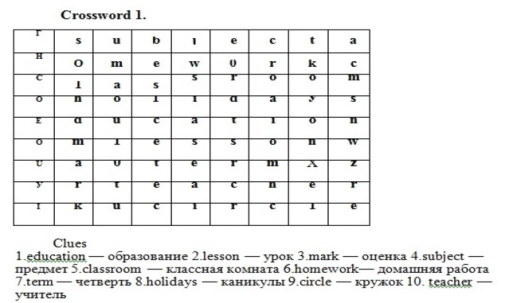
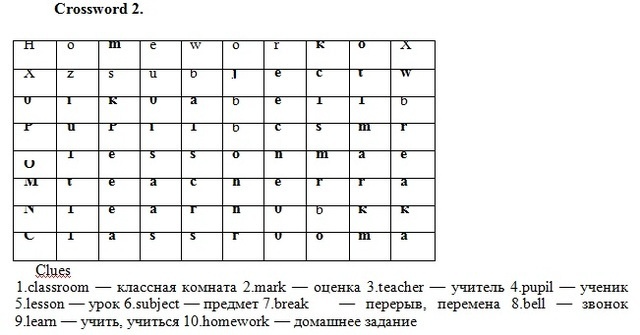
3.SORTING THE WORDS (for the third pairs)
Children! You should sort the words and fill in the tables.
Task 1.
Table, chair, doctor, Literature, bed, chest of drawers, Chemistry, Sports, teacher, engineer, carpenter, TV-set, farmer, fireplace, gardener, English, History, journalist, shelf, Arts, musician.
Professions
School subjects
Furniture
Task 2.
Book, dress, frog, elephant, newspaper, notepad, hat, socks, fox, paper, coat, envelope, bear, crocodile, copybook, textbook, stamp, jacket, tiger, trousers, jeans, pencil.
For reading and writing
Clothes
Animals
4. WRITING CONTEST. Now I invite those who are still free to do another challenging tasks. You should add the adjectives to the nouns given in your papers to make some interesting word combinations.
Snow - Ice - Grass - Cloud –
Elephant - House - Flower - Cucumber —
Tomato — Boy — Mouse — Car –
Book — ___ Lesson — Test — Winter —
English Teacher: Well, let us see how well our teams managed with their tasks. (The pupils introduce the pictures, the crosswords and check tasks 3 and 4( slides 3,4)). Thanks a lot.
I think we should have some rest now. Please, listen to me and do the actions.
Relaxation.
Pick up, put down, stand up, turn round,
Clap left, clap right, clap up, clap down,
Look left, look right, look up, look down,
Turn round, sit down, touch something... brown!
Round 3.
English Teacher: Well, children! Now let’s do some more thrilling tasks.
1. Name the odd word. Representatives of both teams should listen to four words and name the odd word one after another.
1. Spring, winter, January, summer.
2. Red, blue, big, pink.
3. Ukraine, the USA, President, Great Britain.
4. Desk, chair, table, room.
5. Juice, tea, milk, salad.
6. Sunday, Wednesday, October, Saturday.
7. Where, when, to, who, what.
8. English, Ukrainian, Italy, French.
9. April, May, Sunday, December.
10. Mother, father, teacher, sister.
2. Tell me what do you need in these situations?
1. You are playing football.( a ball)
2. You are doing your homework. (а pen, a textbook, a computer )
3. You are reading. (а book)
4. You are watching TV.(а TV set)
5. You are going shopping. (а bag, money)
6. You are cooking. ( Fruit, vegetables, meat, fish).
7. You are writing. (а pen)
8. You are drawing.( Paints, penсils)
3. Explain to what sort the word belongs to.
The Thames (a river), Ukraine (a country), London ( a city), Halloween ( a holiday)
Winter ( a season), Literature (a lesson), English ( a language), Cheese ( food),
Black ( a colour), Rose ( a flower), Tennis (a sport), Pig (an animal).
4. Answer the questions:
1. How do we call a very big town? (a city)
2. Summer goes after ... ( spring)
3. Your mother’s husband. (my father)
4. Your father’s brother. ( my uncle)
5. They can fly. ( birds)
6. They can swim. ( fish)
7. A daughter of the queen. ( princess)
8. The teacher writes on it with chalk. ( a blackboard)
5. Match the names with their shortenings. ( Slide5 )
Key: 1.Elizabeth- Liz; 2. Thomas – Tom; 3. William – Bill; 4. Susan – Sue; 5. Michal – Mike;
6. Robert – Bobby; 7. Patricia – Pat; 8. Anthony – Tony; 9.Pamela – Pam; 10. Richard – Dick.
6. How do you know the names of jobs?
Give as many names of jobs as possible beginning with the letters.
· A... ( artist, actor),
· P... (policeman, pilot),
· S... (sailor, seller),
· G... (gardener),
· D.. (dentist, doctor),
· T. (teacher, teller ).
· B... (builder, butcher, baker, bookkeeper),
· M... (musician, musician),
· C ... (correspondent, computer programmer)
English Teacher: Well, thanks a lot. Our next task is a kind of relaxation too. So, show that you are:
1.Flying 2.Running 3.Playing volleyball 4.Thinking 5.Having lunch 6. Smiling
7.Getting up 8.Singing 9.Dancing 10.Jumping 11.Sleeping 12.Swimming
13.Playing the guitar 14.Playing the piano 15.Washing 16.Brushing your teeth
17.Playing snowballs 18.Listening to the teacher.
Round 4.
1. Look at the blackboard and choose the correct word to complete the sentence. (Slide 6)
1. Bill lives in the USA. He is ... .
a) British; b) Canadian; c) American.
2. She is 38, she is married. She is.... Smith.
a) Ms; b) Mrs; c) Miss.
3. Your father works at the shop. He is a ... .
a) shop assistant; b) secretary; c) sailor.
4. We usually jump and run at the ... lessons.
a) Sport; b) Literature; c) Handicraft.
5. Tina is a very pretty girl with long …. hair.
a) red; b) short; c) round;
6. There is a big new … in the kitchen.
a) car; b) fridge; c) piano;
2. Fill in the blanks with the correct words. (Slide 7)
1. Kyiv is to Ukraine as ... is to Great Britain.
2. Black is to white as hot is to ... .
3. A boy is to a man as a ... is to a woman.
4. A page is to a book as a room is to a ... .
5. March is to May as September is to ... .
6. A doctor is to hospital as a... is to school.
7. Listen is to radio as ... is to television.
8. The Dnipro is to Kyiv as ... is to London.
Keys: 1 London; 2 cold; 3 girl; 4 house; 5 November; 6 teacher; 7 watch; 8 the Thames.
3. Match two columns to get some English sayings and give their Ukrainian equivalents. (Slide 8)
1. As white as…
a) a flower
2. As busy as...
b) a horse
3. As brave as...
c) a sheet
4. As fresh as...
d) a lion
5. As strong as...
e) a pig
6. As fierce as...
f) a bee
7. As fat as...
g) a wolf
8. As quiet as...
h) a donkey
9. As light as...
i) an owl
10. As proud as...
j) a fox
11. As wise as...
k) an elephant
12. As stubborn as...
1) a feather
13. As sly as...
m)a peacock
14. As clumsy as...
n) a mouse
Keys: 1.C 2.F 3.K 4.A 5.B 6.G 7.E 8.N 9.L 10. D 11.I 12.H 13.J 14.M (Slide 9)
Round 5.
English Teacher: So, children, you see now that different peoples see and feel the same things differently. At the same time while doing the last exercise we started speaking about another important aspect of mastering the language. I mean customs and traditions of English speaking countries. A good way to do it is learning English proverbs. Your home task was to find and learn English proverbs. The team that has prepared more proverbs will be the winner. We shall work in a following way: while the first team will be representing its proverbs the second team will be giving their Ukrainian equivalents.
( Some proverbs for children to learn: 1. One man — no man. 2.All is well that and well. 3.All that glitters is not gold. 4.Appetite comes in eating. 5.Art is long, life is short. 6.As the tree, so the fruit. 7.Better late than never. 8.Choose a book as you choose a friend. 9.An hour in the morning is worth two in the evening. 10.Cut your coat according to your cloth. 11.East or West, home is best. =There is no place like home. 12.Everything is good in its season. 13.Four eyes see more than two. 14.If you run after two hares, you will catch neither. 15.It is raining cats and dogs. 16.It is never too late to learn. 17.Tastes differ. 18.There is no smoke without fire. 19.Better to do well than to say well. 20. Eggs cannot teach a hen.
1.Один у полі не воїн. 2.Усе добре, що добрий кінець має. 3.Не все те золото, що блищить. 4.Апетит приходить під час їжі. 5.Вік живи — вік учись. 6.Яблуко від яблуні недалеко падає. 7.Краще пізно, ніж ніколи. 8.Вибирай книжку, як обираєш друга. 9.Утро вечора мудріше. 10. По своєму ліжку простягай ніжки. 11.У гостях добре, а вдома найкраще. 12.Усякому овочеві свій час. 13.Один розум добре, а два ще краще. 14. Хто два зайці гонить, жодного не здогонить. 15.Ллє як із відра. 16. Вчитися ніколи не пізно. 17. У кожного свій смак. 18.Все має свій зворотний бік. 19.Менше говори — більше діла твори. 20.Яйця курку не вчать.
Round 5.
English Teacher: Thank you, children! Look at the blackboard, answer the questions and we shall see how much you know about the country the language of which you learn.
( Slides 10-24 )
1. What is the official name of Great Britain? (the United Kingdom of Great Britain and Northern Irland)
2. What is the capital of Great Britain? (London )
3. What is the name of the national flag of the UK? (Union Jack )
4. What river does London stand on? (the Thames)
5. Who is the Official Head of the State in Britain? (Queen Elisabeth II)
6. When did Queen Elisabeth II come to the throne? (In 1952)
7. What is the official London residence of Queen Elisabeth II? (the Buckingham Palace)
8. What is the name of the biggest clock in London? (Big Ben)
9. Whose monument stands in the centre of Trafalgar Square? (Admiral Nelson)
10. The Crown jewels are kept there. (the Tower of London)
11. What is the name of the most famous bridge in London? (the Tower Bridge)
12. How many floors has a typical English house? (two)
13. What is the favorite hot drink in Britain? What is the difference between English and Russian tea? (tea with milk while Russian tea is with lemon)
14. What are the most popular British sports? (football, golf, cricket, tennis, rowing, polo)
Round 6
English Teacher: Now, children, we shall speak about English grammar, one of the most difficult things in language studies. Tell me, please, how many English tenses do you know?
Pupils: We know five English tenses: Present Simple tense , Past Simple tense, Future Simple tense, Present Continuous tense, Past Continuous tensе
English Teacher: Your first task is to match the words-markers with appropriate tenses.
( Slides 25-26)
Team 1. Tomorrow Team 2. Yesterday
Now Usually
At five o’clock yesterday At the moment
Every day Next Friday
Last week The whole evening
In two days Sometimes
Often Ten years ago
Soon From 5 till 6 o’clock yesterday
English Teacher: Your second task is to choose the correct forms of the verbs to complete the sentences and define the tense.
Team 1. ( Slides 27- 28)
Choose the correct forms of the verbs to complete the sentences.
1. Peter ... that window yesterday.
a) doesn’t break
b) won’t break
c) didn’t break
d) hasn’t broken
2. They ... to Italy next month.
a) travel
b) will travel
c) travelled
d) have travelled
3. ... your sister often ... to the theatre?
a) Does/go
b) Is/going
c) Did/go
d) Has/gone
4. I ... my History project now.
a) don’t write
b) am not writing
c) didn’t write
d) haven’t written
5. Children ... a new film in their room the whole evening yesterday.
a) watch b) are watching
c) watched d) were watching
Keys: 1c, 2b, 3a, 4b, 5d.
Team 2. ( Slides 29-30)
Choose the correct forms of the verbs to complete the sentences.
1.Where ... you usually ... on Sundays?
a) do/go
b) are/going
c) will/go
d) did/go
2.Molly ... basketball next Thursday.
a) doesn’t play
b) isn’t playing
c) won’t play
d) didn’t play
3.I ... your e-mail yesterday.
a) don’t get
b) didn’t get
c) won’t get
d) hasn’t got
4.... Susan ... on the phone now?
a) Does/speak
b) Is/speaking
c) Did/speak
d) Will/speak
5.I ... this picture at 5 o’clock yesterday.
a) paint b) paints
c) was painting d) painted
Keys:1a, 2c, 3b, 4b, 5c.
IV. SUMMING-UP
English Teacher: Well, children! Let’s sum up our today’s talk about the ways of mastering the English language. What do you think you should do to improve your English?
Pupils:
· Learning English should not stop after the English lesson at school is over.
· Read a magazine or a newspaper in English. It’ll help grow your vocabulary.
· Listen and sing English songs. It’s good for your pronunciation.
· Watch films in English. It’s important for your listening skills.
· Make pen friends with some English-speaking children. It’ll help to improve your communication skills.
· Do exercises in written form. It’s useful for your spelling.
· Speak English as much as you can.
· Study hard and do your homework.
· Look up every new word.
· Use every moment to practice English
· Make up shows and parties in English with your friends.
· Act role plays in English.
· Start an English newspaper or a magazine with your friends.
· Listen to English as much as you can.
· Write new phrases or words in your vocabulary notebook.
· Make up your own rules on how to learn the language.
English Teacher: Thank you, children. You are right. All these things really can help us improve our English.
And now it’s time for the jury to sum up the results of our contest. ( Slide 31)
I hope you have enjoyed the English party. Thank you very much for taking an active part in our contest. Best wishes to you. Good-bye.
«Young learners of English»
«Nature in our lives»
Проведення радіожурналу – ефективна форма роботи, яка передбачає збір матеріалів, підготовку, презентацію та аналіз виступу. До підготовки радіожурналу можна залучити учнів різних здібностей та інтересів, стимулювати їх спільну пошукову діяльність.
Сторінки радіожурналу зачитуються учнями під музику. Кожна сторінка має своє музичне оформлення.
Page 1. «We are part of the Nature”
Many people like to live in cities. They like big houses, busy streets and cars. But they also love nature. During their vacations they go to the woods, to the seaside or spend a good time in the country. They like to watch animals, birds in the forest or in the fields.
1. Come to the woods
On a sunny day,
Come to the woods
On a day in May
Look at the grass
At the busy bees,
Look at the birds
In the green, green trees.
2. A Meeting
A flower is looking through the ground,
Blinking at the April weather,
Now a child has seen the flower,
Now they go and play together.
Now it seems the flower will speak,
And will call the child its brother-
But, oh strange forgetfulness?
They don't recognize each other.
By H. Munroe
Wild Kingdom
All woods are home to animals
So we behaved like guests
We only looked and never touched
The birds and rabbits nests.
Page 2. “Our nature is in danger”
People understand that our nature is in danger. Some organizations are founded in different countries to solve ecological problems. Do you know anything about it? What famous international organization do you know? Certainly, it's GREEN PEACE. It’s a world-known organization which does a lot to protect our nature.
“Every ten minutes, one kind of animal, plant or insect disappears. If nothing is done about it, over one million species will disappear in twenty years from now.
The seas are in danger. They are filled with poison: industrial and nuclear waste. The Mediterranean is already nearly dead, the North Sea is following. If nothing is done about it, one day nothing will be able to live in the seas.
The tropical rainforests, which are the home of half the Earth’s living things, are being destroyed. If nothing is done about it, they will disappear in twenty years.
Fortunately, there are people who are trying to do something about it.
In 1961, the World Wildlife Fund (WWF) was founded – a small group of people who wanted to raise money to save animals and plants. Today, the World Wildlife Fund is a large international organization. It has raised over 35 million pounds for conservation projects, and has created or given support to National Parks in five continents. It has helped 30 mammals and birds to survive. Perhaps this is not much, but it is a start. If more people give money – and if more governments think of what is happening – perhaps the world Wildlife Fund will be able to help us to protect the natural world and all of us with it.”
Page3. “The most serious problems”
One of the most serious problems is air pollution. More and more factories cars and lorries add their bad breath to the air. Of course, cars are the world's biggest air polluters. There are a great number of cars in our cities and towns. In cold winter days their engines work day and night. They add their bad breath to the air.
Another serious problem is water pollution. There are a lot of lakes and rivers around in our country. People like to swim in hot summer days there. Some people are fond of fishing. But many rivers are dirty now. On the banks of the lakes and rivers there is a lot of litter. People leave bottles, paper, food after their resting. Sometimes they throw them into the water and it's dangerous to swim there, because you may hurt your feet. That's why it's necessary to clean our lakes and our park and keep them clean.
One of the most serious problems is our countryside. There are great forests in our country. Twenty years ago they were rich in wild animals, mushrooms and berries. Has the countryside changed with the developing of oil-drilling industry? Yes, of course. Our countryside has changed greatly. Wild animals have disappeared in these places. We can not eat the fish from our rivers because it is not very good for our health. In the result of man's activities a lot of species have disappeared. You can see them only in the Red Book.
Page 4. “The World around Us is Wonderful. Protect it”
How can we help to protect the environment?
- We must keep the country tidy.
- We must grow flowers and trees.
- We must protect animals and birds.
- Wе should not throw trash in the streets or parks. A lot of trash can be recycled.
So we all must work together to keep our world green. The world around us is wonderful. Let's preserve it.
Фотозвіт
Photo report
Знайомство. День європейських країн.
Acquaintance. Day of European countries.
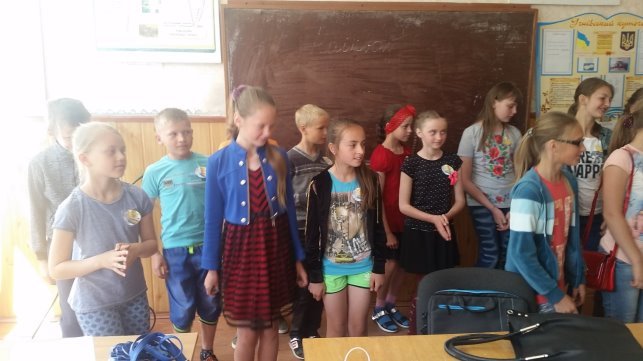
Our emblem
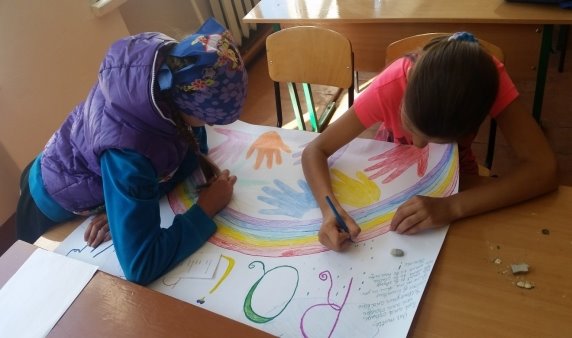
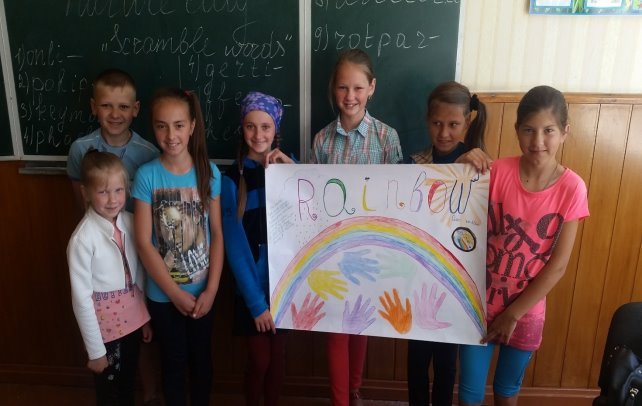
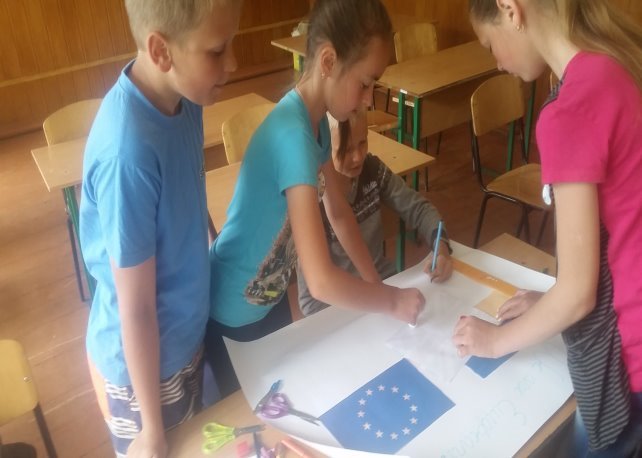
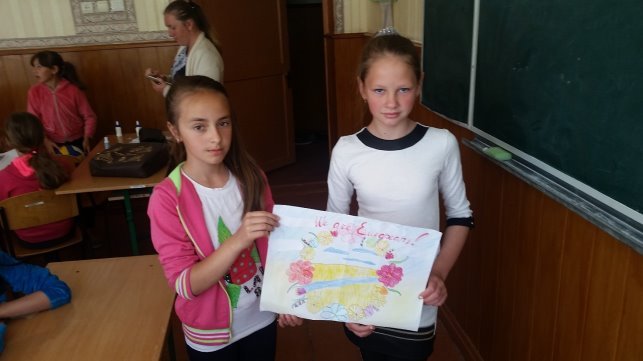
We are playing outdoor
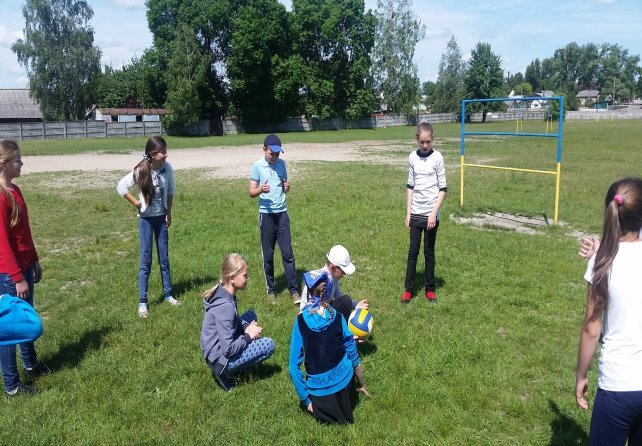
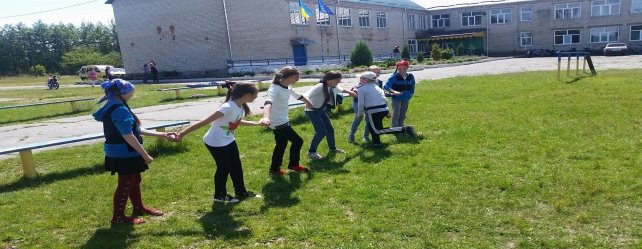
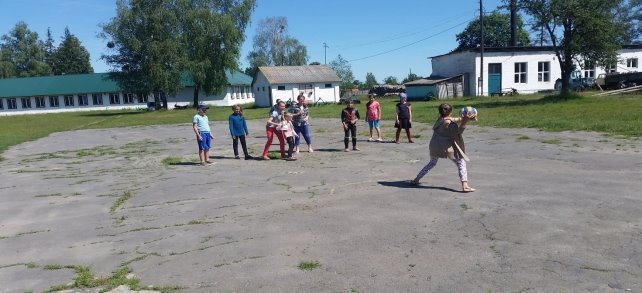
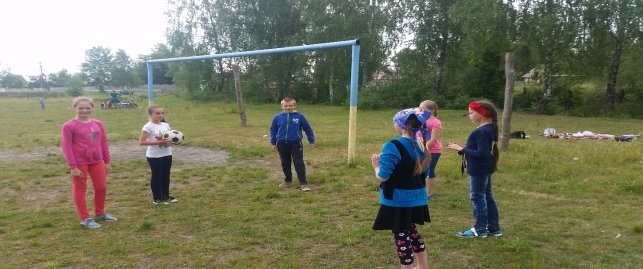
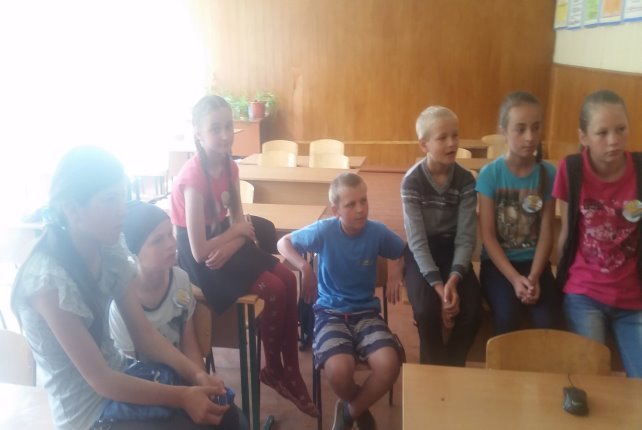
We are watching cartoon “The Good dinosaur”
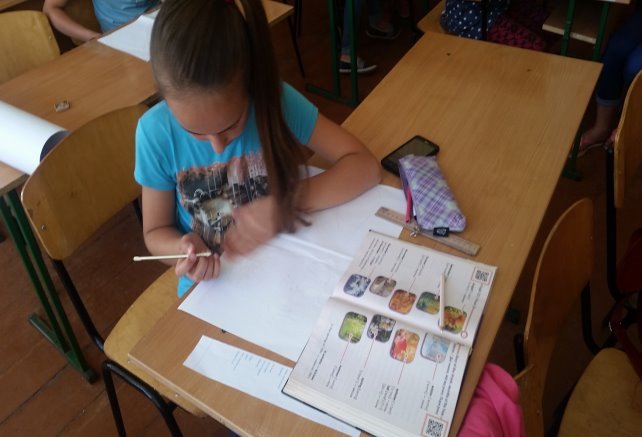
Day of nature. We are making posters about nature.
Day of healthy style of life
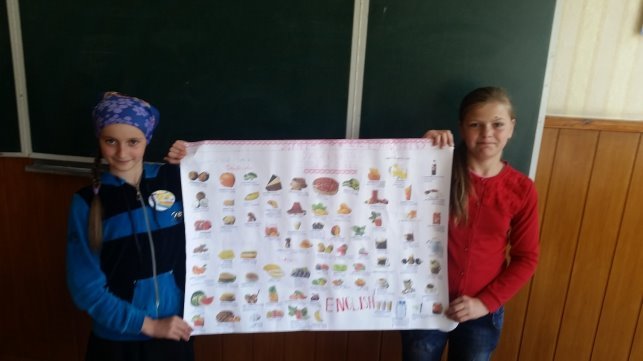
«Nature in our lives»


про публікацію авторської розробки
Додати розробку
